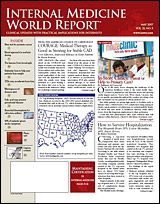Antidepressants and Antiepileptics Work Synergistically
From the American Academy of Pain Medicine
NEW ORLEANS—Antidepressants and antiepileptics appear to be effective for treating a variety of neuropathic pain syndromes, such as diabetic neuropathy, postherpetic neuralgia, and poststroke neuropathy. Data reported at the American Academy of Pain Medicine (AAPM) meeting suggest that combination therapy using the 2 drug classes may be superior to a single medication from either class alone, but caution is prudent because of potential drug interactions.
In this retrospective study, researchers analyzed the charts of 6129 patients who were diagnosed with neuropathic pain. Visual analogue scale (VAS) score, procedure done, and antidepressant and antiepileptic use and dose were analyzed for each visit. Among the patients (mean age, 54 years) reviewed, 55% had been prescribed at least 1 antidepressant or antiepileptic. The patients with a ≥50% improvement in VAS scores were considered to have a favorable response.
“We found that there was a synergistic effect with the 2 types of medications together,” said lead investigator Damon Robinson, MD, of Beth Israel Deaconess Medical Center, Boston.
N-methyl-
d
-aspartate
“There are 2 different pathways involved with the 2 different classes of medications,” he said. “Antiepileptics may work through modulation of both peripheral and central components of pain by several routes. First, through antagonism of sodium channels; second, through inhibition of excitatory transmission as mediated by NMDA [] receptors; and third, through the enhancement of GABA [gamma-aminobutyric acid]-mediated inhibition. As for tricyclic antidepressants, they work through enhancing inhibition from the brainstem to the spinal cord by inhibiting the reuptake of the biogenic amines.”
Dr Robinson noted it is probably best for physicians to start with 1 medication and titrate up, and then add on the second medication if the neuropathic pain is not improved. The tricyclic agents appear to have greater efficacy than the selective serotonin reuptake inhibitors, he added.
IMWR
“Antiepileptics and antidepressants have historically been demonstrated to be efficacious in treating neuropathic pain when used as single lines of therapy. However, the 2 agents may have additive/ synergistic effects when used together. Because this is the first study to look at antidepressants and antiepileptics used to­gether, more research needs to be conducted in this area,” Dr Robinson told .
Frederick Burgess, MD, PhD, president of the AAPM, said that the findings make a great deal of sense, and that they should be of interest to primary care physicians, who are seeing growing numbers of patients with neuropathic pain, especially diabetic neuropathy.
IMWR
“When you look at these drugs, they work at different locations in the body, and so a combination can often result in a greater effect. In this case, it may be possible for you to get away with using much lower doses of both drugs, and this may reduce specific side effects,” Dr Burgess, of Brown University, Providence, RI, told .
“You have to go cautiously when combining drugs, particularly in older patients. You generally need to start with one medication, and then cautiously add in another drug if you are not ­seeing the results you want.” Dr Burgess did add one caveat. “However, the key is, you need to start low and go slow.”
